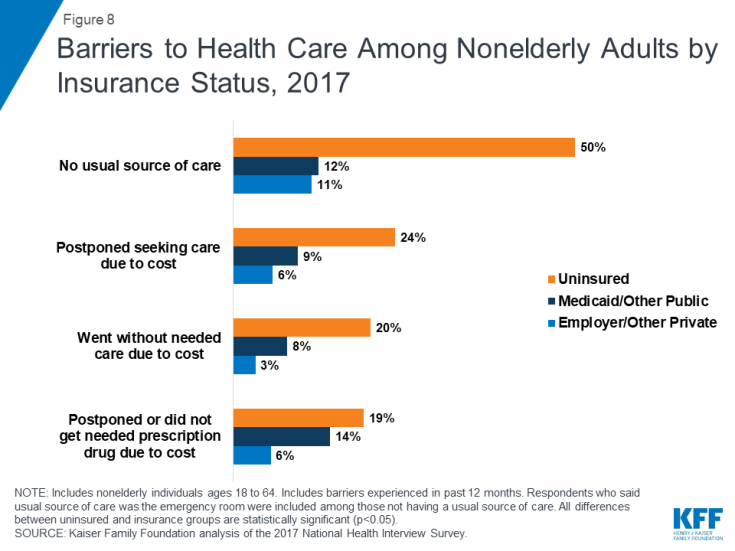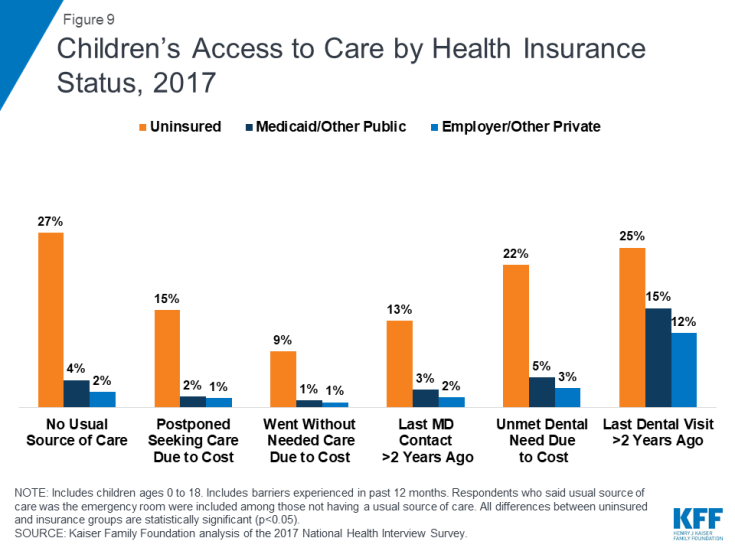The Uninsured and the ACA: A Primer - Key Facts about Health Insurance and the Uninsured amidst Changes to the Affordable Care Act
How does lack of insurance affect access to care?
Health insurance makes a difference in whether and when people get necessary medical care, where they get their care, and ultimately, how healthy they are. Uninsured people are far more likely than those with insurance to postpone health care or forgo it altogether. The consequences can be severe, particularly when preventable conditions or chronic diseases go undetected.
Compared to those who have health coverage, people without health insurance are more likely to skip preventive services and report that they do not have a regular source of health care. Adults who are uninsured are over three times more likely than insured adults to say they have not had a visit about their own health to a doctor or other health professional’s office or clinic in the past 12 months.1 They are also less likely to receive recommended screening tests such as blood pressure checks, cholesterol checks, blood sugar screening, pap smear or mammogram (among women), and colon cancer screening.2 Part of the reason for poor access among the uninsured is that half do not have a regular place to go when they are sick or need medical advice, while the majority of insured people do have a regular source of care (Figure 8).3
Uninsured people are more likely than those with insurance to report problems getting needed medical care. One in five (20%) uninsured adults say that they went without needed care in the past year because of cost compared to 3% of adults with private coverage and 8% of adults with public coverage.4 Many uninsured people do not obtain the treatments their health care providers recommend for them. In 2017, 19% of uninsured adults said they delayed or did not get a needed prescription drug due to cost, compared to 14% with public coverage and 6% with private coverage.5 And while insured and uninsured people who are injured or newly diagnosed with a chronic condition receive similar plans for follow-up care from their doctors, people without health coverage are less likely than those with coverage to obtain all the recommended services.6,7
Because uninsured people are less likely than those with insurance to have regular outpatient care, they are more likely to have negative health consequences. Because uninsured patients are also less likely to receive necessary follow-up screenings than their insured counterparts,8 they have an increased risk of being diagnosed at later stages of diseases, including cancer, and have higher mortality rates than those with insurance.9,10,11 In addition, when uninsured people are hospitalized, they receive fewer diagnostic and therapeutic services and also have higher mortality rates than those with insurance.12,13,14,15
Uninsured children also face problems getting needed care. Uninsured children are more likely to lack a usual source of care, to delay care, or to have unmet medical needs than children with insurance (Figure 9).16 Further, uninsured children with common childhood illnesses and injuries do not receive the same level of care as others and are at higher risk for preventable hospitalizations and for missed diagnoses of serious health conditions.17,18 Among children with special health care needs, those without health insurance have worse access to care than those with insurance.19
Lack of health coverage, even for short periods of time, results in decreased access to care. Research has shown that adults who experience gaps in their health insurance coverage are less likely to have a regular source of care or to be up to date with blood pressure or cholesterol checks than those with continuous coverage.20 Research also indicates that children who are uninsured for part of the year have more access problems than those with full-year coverage.21,22 Similarly, adults who lack insurance for an entire year have poorer access to care than those who have coverage for at least part of the year, suggesting that even a short period of coverage can improve access to care.23
Research demonstrates that gaining health insurance improves access to health care considerably and diminishes the adverse effects of having been uninsured. A seminal study of a Medicaid expansion in Oregon found that uninsured adults who gained Medicaid coverage were more likely to have an outpatient visit or receive a prescription and less likely to have depression or stress in the short term than their counterparts who did not gain coverage.24 Findings two years out from the expansion showed significant improvements in access, utilization, and self-reported health among the adults who gained coverage.25 In addition, a large body of research on the impact of Medicaid expansion under the ACA demonstrates that gains in Medicaid coverage positively impact access to care and utilization of health care services.26 Research also shows that individuals who gained marketplace coverage in 2014 were far more likely than those who remained uninsured to obtain a usual source of care and receive preventive care services.27
Public hospitals, community clinics and health centers provide a crucial health care safety net for uninsured people; however, the safety net does not close the access gap for the uninsured. Safety net providers, including public and community hospitals, community health centers, rural health centers, and local health departments, provide care to many people without health coverage. In addition, nearly all other hospitals and some private physicians provide some charity care. However, safety net providers have limited resources and service capacity, and not all uninsured people have geographic access to a safety net provider.28,29 The ACA has led to significant growth in the number of health centers and their service capacity through both new grant funds and new patient revenues due to expanded coverage.30 However, this impact has been more limited in states not expanding Medicaid, where a much larger share of health center patients remains uninsured than in states that did expand.31 In addition, health centers in all states report that securing needed specialty care for their uninsured patients is a major challenge.32


